14 start with S start with S
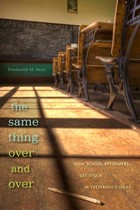
In this genial and challenging overview of endless debates over school reform, Rick Hess shows that even bitter opponents in debates about how to improve schools agree on much more than they realize—and that much of it must change radically. Cutting through the tangled thickets of right- and left-wing dogma, he clears the ground for transformation of the American school system.
Whatever they think of school vouchers or charter schools, teacher merit pay or bilingual education, most educators and advocates take many other things for granted. The one-teacher–one-classroom model. The professional full-time teacher. Students grouped in age-defined grades. The nine-month calendar. Top-down local district control. All were innovative and exciting—in the nineteenth century. As Hess shows, the system hasn’t changed since most Americans lived on farms and in villages, since school taught you to read, write, and do arithmetic, and since only an elite went to high school, let alone college.
Arguing that a fundamentally nineteenth century system can’t be right for a twenty-first century world, Hess suggests that uniformity gets in the way of quality, and urges us to create a much wider variety of schools, to meet a greater range of needs for different kinds of talents, needed by a vastly more complex and demanding society.




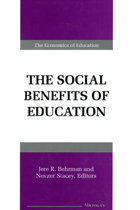
Those papers, revised and updated, are collected here. Kenneth J. Arrow provides perspective on education and preference formation, and Jere R. Behrman considers general conceptual and measurement issues in assessing the social benefits of education and policies related to education. These issues are taken up by experts in four fields--health, parenting, the environment, and crime. Themes addressed include measurement issues regarding what we mean by education and its benefits; basic analytical issues in assessing the impact of education on these social benefits using behavioral data; and whether the social benefits of education justify public policy interventions.
Jere R. Behrman is William R. Kenan Jr. Professor of Economics, University of Pennsylvania. Nevzer G. Stacey is Senior Research Analyst, Office of Educational Research, U.S. Department of Education.
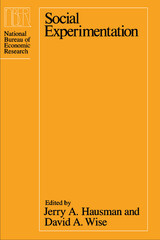
The first section of the book looks at four types of experiments and what each accomplished. Frank P. Stafford examines the negative income tax experiments, Dennis J. Aigner considers the experiments with electricity pricing based on time of use, Harvey S. Rosen evaluates housing allowance experiments, and Jeffrey E. Harris reports on health experiments. In the second section, addressing experimental design and analysis, Jerry A. Hausman and David A. Wise highlight the absence of random selection of participants in social experiments, Frederick Mosteller and Milton C. Weinstein look specifically at the design of medical experiments, and Ernst W. Stromsdorfer examines the effects of experiments on policy. Each chapter is followed by the commentary of one or more distinguished economists.
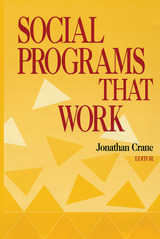

How can we create high-quality learning environments for children from socially, politically, and economically marginalized groups? How do early childhood programs help to overcome the challenges created by poverty? Seeking to answer these questions, The Starting Line delves into the ups and downs of early education programs serving Latinas/os in Texas, using the state as a window into broader debates about academic opportunity and the changing demographics of the United States.
Immersing readers in the day-to-day activities of Texas's early childhood education programs, Robert Crosnoe illuminates how significant obstacles can stymie the best intentions. Crosnoe pays particular attention to the complex connections among classrooms, schools, families, and communities, as well as the frequently unfolding interplay of educational philosophies. The result is a story highlighting the promises of early childhood education, the perils faced in attempting to fulfill them, and the degree to which Texas stands at the forefront of some larger movements and lags behind in others.
Giving voice to bilingual educators and low-income Latina/o families, this book is a timely exploration of the strengths and needs of what will soon be the largest share of the US child population.
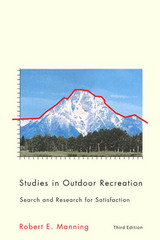
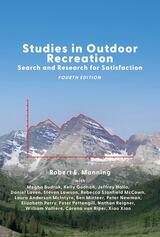
Since its original publication in 1986, Studies in Outdoor Recreation has been a standard text in courses on parks and outdoor recreation and serves as an invaluable reference for park and recreation managers. The first book to integrate the social science literature on outdoor recreation, it reviews studies from this broad, interdisciplinary field and synthesizes them into a body of knowledge, providing an historical perspective on outdoor recreation research and developing its practical management implications.
This fourth edition includes a new preface and is completely revised to reflect current research and new concerns in the field. A new chapter examines emerging issues such as sustainable transportation and the impacts of climate change.
An essential resource for students, scholars, and professionals, Studies in Outdoor Recreation explores the theoretical and methodological issues in outdoor recreation and describes the management implications of outdoor recreation research.
Contributors to the fourth edition include Laura Anderson, Megha Budruk, Kelly Goonan, Jeffrey Hallo, Daniel Laven, Steven Lawson, Rebecca Stanfield McCown, Ben Minteer, Peter Newman, Elizabeth Perry, Peter Pettengill, Nathan Reigner, William Valliere, Carena van Riper, and Xiao Xiao.


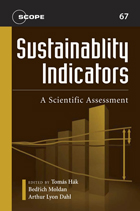
READERS
Browse our collection.
PUBLISHERS
See BiblioVault's publisher services.
STUDENT SERVICES
Files for college accessibility offices.
UChicago Accessibility Resources
home | accessibility | search | about | contact us
BiblioVault ® 2001 - 2024
The University of Chicago Press









